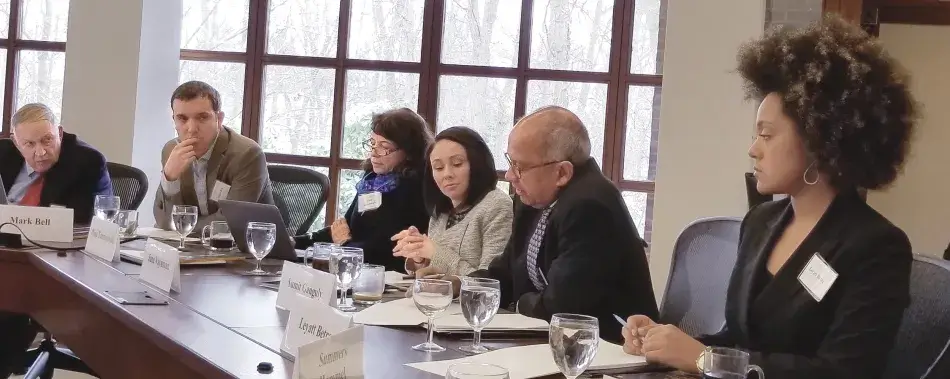Global Security and International Affairs

The Global Security and International Affairs program area draws on the expertise of policy-makers, practitioners, and scholars to foster knowledge and inform innovative and more sustainable policies to address critical issues affecting the global community. To achieve this goal, our projects engage with pressing strategic, development, and moral questions that underpin relations among people, communities, and states worldwide. Each of our initiatives embraces a broad conception of security as the interaction among human, national, and global security imperatives. Our recommendations seek to move beyond the idea of security as the absence of war toward higher aspirations of collective peace, development, and justice.
Global Security and International Affairs
Committee on International Security Studies
Committee Chair
Scott D. Sagan
Stanford University
Committee Members
Nicholas Burns
Harvard University
Antonia Chayes
Tufts University
Christopher Chyba
Princeton University
Karl Eikenberry
Stanford University
Tanisha Fazal
University of Minnesota
Martha Finnemore
George Washington University
Rita Hauser
The Hauser Foundation
Robert Legvold
Columbia University
Rose McDermott
Brown University
Steven E. Miller
Harvard University
Barry Posen
Massachusetts Institute of Technology
Adam Roberts
University of Oxford
Kathryn Sikkink
Harvard University
Paul Wise
Stanford University
PROJECT
New Dilemmas in Ethics, Technology, and War
The project on New Dilemmas in Ethics, Technology, and War explores the ethical and legal issues created by changes in military technology and the evolving character of warfare. This study follows from the observation that although technological innovations and political developments are altering the conventional way in which warfare is conducted, efforts to align the international legal framework with this evolving context have lagged behind. The rise of nonstate actors and the deployment of new military technology, such as drones and cyber weapons, have eroded and undermined the ethical and legal fabric traditionally provided by the International Law of Armed Conflict.
One of the most notable impacts of this project has been in the policy realm, where the gap between law and policy continues to widen, largely justified by national security concerns. The project has shed light on the nefarious consequences of delivering policies divorced from legal obligations and ethical considerations. Scholars, practitioners, and policy-makers have found many of the project’s findings of particular interest. These include:
- the principle of necessity in nuclear targeting, which would require the United States to pledge not to use nuclear weapons when a target can be destroyed using conventional capabilities;
- the inclusion of the indirect human costs of war–which usually far exceed the direct costs–in considerations of whether a proposed attack complies with the principles of proportionality; and
- the need to think of emerging technologies not only as potential tools for warfare, but more importantly as tools both for the de-escalation of conflict and for peace.
The project has produced two issues of Dædalus that, together with an extensive, ongoing outreach strategy, are influencing and shaping policy debates by identifying and disseminating key lessons learned and policy recommendations that might be of value to policy-makers and military strategists. Through meetings and discussions, the project has engaged with more than eight hundred students, scholars, and policy-makers, including Congressional staff in the United States as well as the leadership from the UN Department of Peacekeeping Operations, Department of Political Affairs, and High Commissioner for Refugees. Organizations ranging from the U.S. National Security Council and Office of the Secretary of the Air Force to the UN Department of Field Support have requested copies of the Dædalus issues or have distributed select essays internally. At least six universities and military staff colleges, including Stanford University, Columbia University, the Middlebury Institute of International Studies at Monterey, and the U.S. Military Academy at West Point, have adopted the Dædalus volumes as part of their curriculum.
In addition, the project has initiated new discussions and fostered collaborations with military academies as well as formed a number of strong partnerships with international organizations.
To complement the New Dilemmas in Ethics, Technology, and War project, the Academy established a new project on Civil Wars, Violence, and International Responses to explore how the changing nature of conflict necessitates new approaches from the international community. More information about the Civil Wars project is available below.
Project Chair
Scott D. Sagan
Stanford University
Steering Committee
Norman R. Augustine
Lockheed Martin Corporation, ret.
Lloyd Axworthy
University of Waterloo; formerly, Department of Foreign Affairs, Trade, and Development, Government of Canada
James Ellis
Stanford University; Institute of Nuclear Power Operations, ret.; U.S. Navy, ret.
Tanisha Fazal
University of Minnesota
Jennifer Leaning
Harvard University
Gilman Louie
Alsop Louie Partners; formerly, In-Q-Tel
David Luban
Georgetown University
Mark Martins
U.S. Army, Judge Advocate General’s Corps
Aryeh Neier
Paris School of International Affairs of Sciences Po
Janne Nolan
George Washington University
Barry Posen
Massachusetts Institute of Technology
Nancy Sherman
Georgetown University
Michael Walzer
Institute for Advanced Study
Jennifer Welsh
European University Institute
Project Staff
Francesca Giovannini
Kathryn Moffat
Funders
Humanity United
John D. and Catherine T. MacArthur Foundation
The Rockefeller Foundation
PROJECT PUBLICATIONS \\ NEW DILEMMAS IN ETHICS, TECHNOLOGY, AND WAR
“Ethics, Technology & War,” Dædalus (Fall 2016)
“The Changing Rules of War,” Dædalus (Winter 2017)
PROJECT MEETINGS \\ NEW DILEMMAS IN ETHICS, TECHNOLOGY, AND WAR
Briefings with International Organizations and NGOs
July 5–7, 2017
Geneva, Switzerland
Project contributor Paul Wise shared the findings of his Dædalus essay, which discusses how technology can help us better understand the full human costs of war, with representatives of the United Nations High Commissioner for Refugees, the UN Office for the Coordination of Humanitarian Affairs, the World Health Organization, the International Committee of the Red Cross, and Médecins San Frontières.
Participants
Paul Wise
Stanford University
Kathryn Moffat
American Academy of Arts and Sciences
Waging Just Wars in the 21st Century?
September 2, 2017
San Francisco, CA
The New Dilemmas in Ethics, Technology, and War project convened a panel discussion during the 2017 Annual Meeting of the American Political Science Association. Selected Dædalus contributors discussed some of the ethical questions raised by the use of new military technology, and explored whether a new normative and legal framework for warfare in the twenty-first century is possible.
Participants
Neta C. Crawford
Boston University
David Fidler
Indiana University
Francesca Giovannini
American Academy of Arts and Sciences
Michael C. Horowitz
University of Pennsylvania
Scott D. Sagan
Stanford University
Michael Walzer
Institute for Advanced Study
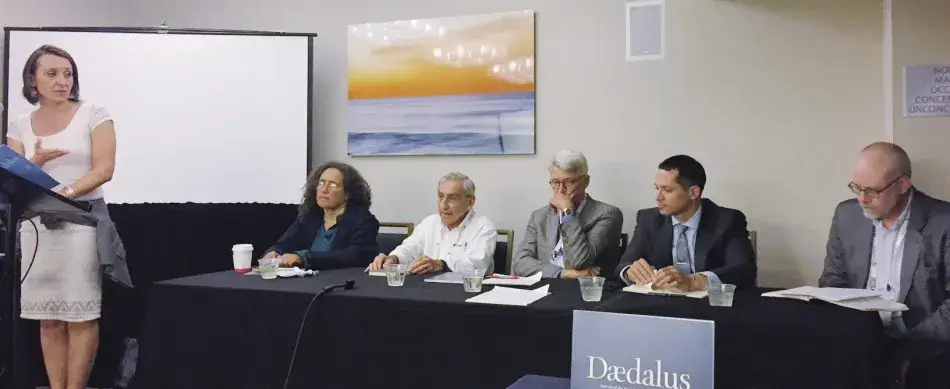
Objects of Wonder: The Face of Battle without the Rules of War
December 5, 2017
Washington, D.C.
As part of a lecture series drawing on items in the National Museum of Natural History’s Objects of Wonder exhibition, Scott Sagan delivered a lecture drawing on his Dædalus essay, “The Face of Battle without the Rules of War: Lessons from Red Horse & the Battle of Little Bighorn.” In a series of drawings now housed in the National Anthropological Archives at the National Museum of Natural History, Red Horse, a Minneconjou Sioux warrior who fought at the 1876 Battle of the Little Bighorn – also known as Custer’s Last Stand – vividly and candidly portrayed the unrestrained brutality of the battle and its aftermath. Professor Sagan discussed how this artwork not only helps us gain insight into what warfare was like without the laws of armed conflict to constrain violence, but also understand better contemporary warfare in the age of fast-paced technology.
Speakers
Scott D. Sagan
Stanford University
Jake Homiak
National Anthropological Archives
The Nuclear Posture Review, North Korea, and Nuclear Use
March 23, 2018
Washington, D.C.
The New Dilemmas in Ethics, Technology, and War project convened a private, off-the-record discussion on Capitol Hill with Congressional staffers and other D.C.-based experts. Hosted in collaboration with the Nuclear Security Working Group, the discussion featured General C. Robert Kehler (USAF, ret.), former commander of United States Strategic Command and author of “Nuclear Weapons & Nuclear Use,” which was published in one of the issues of Dædalus produced as part of the project. Janne Nolan (George Washington University), also a Dædalus contributor for the Ethics project, led the discussion that focused on the ethical and legal aspects of considerations around nuclear use, challenges to stability and nonproliferation, and the 2018 Nuclear Posture Review.
Speakers
C. Robert Kehler
U.S. Air Force, ret.
Janne Nolan
George Washington University
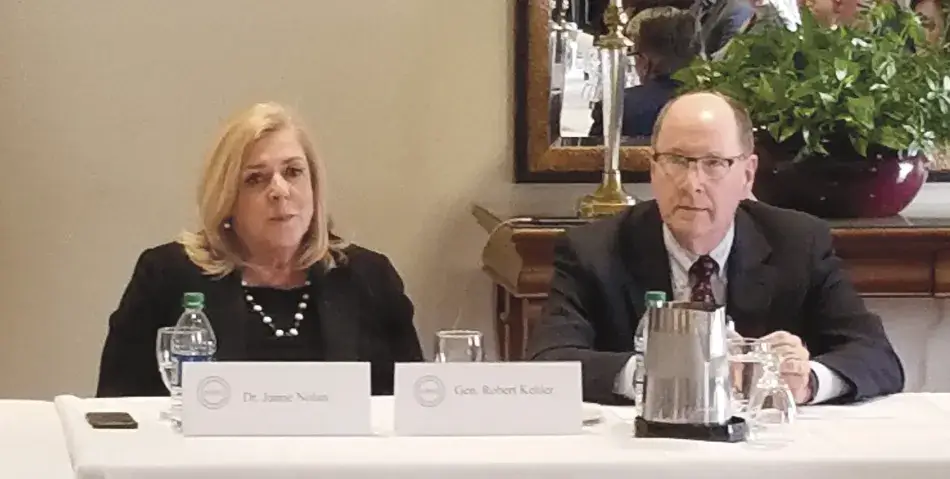
PROJECT
Civil Wars, Violence, and International Responses
The Civil Wars, Violence, and International Responses project builds and expands on the work of the New Dilemmas in Ethics, Technology, and War project. Civil wars are endemic in the international system and all historical ages have in some form borne the costs resulting from internal violence, weak state- hood, and ethnic and religious hatred.
The risks and threats associated with civil wars and state disorder affect more than just the state in question; civil wars often carry adverse consequences for regional and global stability. The project has therefore identified six threats that emerge from civil wars and intrastate violence: pandemic diseases, transnational terrorism, migration, regional instability, great power conflict, and criminality. Some existing approaches, such as the “standard treatment” model – meaning UN peace-keeping plus some foreign assistance – have worked well, but only under very specific and often restrictive conditions. Other more robust approaches, involving deep economic investments and the presence of external actors and international organizations, have drained already scarce international resources and brought about limited results.
The project has produced two issues of Dædalus that explore how civil wars and state disorder are situated currently in the international system; highlight some of the most pressing challenges emerging from civil wars and state disorder; pre- sent several case studies, such as the Western Balkans, Sri Lanka, Colombia, and Ethiopia; and offer various policy responses to civil wars, more generally.
One of the primary observations that has emerged from the project is that approaches for preventing, mitigating, and resolving civil wars and intrastate violence are often far too ambitious. They frequently overpromise stability, security, peace, democracy, and development to countries experiencing high levels of violence and instability.
Project participants traveled to Nigeria in November 2017 and met with Nigerian and U.S. government officials, UN representatives, and nongovernmental organization leaders, among others, to discuss early findings and develop policy recommendations. Several contributors participated in closed-door briefings at the U.S. Department of Defense in January 2018 and met with the National Security Council in April 2018. Future out- reach activities will include meetings with government leaders, decision-makers, academics, heads of nongovernmental organizations, and journalists in Ethiopia and Colombia, among other strategically chosen locations. These discussions will help shape an occasional paper, to be published in early 2019, that will be used to inform policy-makers in Washington, D.C., as well as the international community.
Several departments within the United Nations and the U.S. government as well as the United States Institute of Peace and domestic and international academic institutions have consulted with the project participants and used the findings of the project to inform their work. For example, project members participated in workshops with high and mid-level staff at the United Nations and were involved in conversations leading up to the publication of the 2017 Pathways to Peace report released jointly by the World Bank and the United Nations. Project contributors also engaged with experts from the World Health Organization on new methodologies for responding to civil wars and health issues. Military and civilian staff in the Office of the Chairman of the Joint Chiefs of Staff at the Department of Defense drew on the ideas and expertise of the project during an internal reexamination of their counterinsurgency strategy. And several project participants met with the
U.S. Deputy National Security Advisor and with members of her team to discuss the project’s recommendations.
Project Chairs
Karl W. Eikenberry
Stanford University; U.S. Army, ret.
Stephen D. Krasner
Stanford University
Project Members
Michele Barry
Stanford University
Abdeta D. Beyene
Centre for Dialogue, Research, and Cooperation, Ethiopia
Stephen D. Biddle
Columbia University
Tanja A. Börzel
Freie Universität Berlin
Charles Call
American University
Susanna Campbell
American University
Martha Crenshaw
Stanford University
Lyse Doucet
BBC News
Tanisha Fazal
University of Minnesota
James Fearon
Stanford University
Vanda Felbab-Brown
Brookings Institution
Francis Fukuyama
Stanford University
Sumit Ganguly
Indiana University
Miguel García-Sánchez
Universidad de los Andes, Colombia
Richard Gowan
New York University
Sonja Grimm
University of Konstanz, Germany
Jean-Marie Guéhenno
International Crisis Group
Joseph Hewitt
United States Institute of Peace
Stephen Heydemann
Smith College
Bruce Jones
Brookings Institution
Stathis Kalyvas
Yale University
Nancy Lindborg
United States Institute of Peace
Sarah Kenyon Lischer
Wake Forest University
Clare Lockhart
Institute for State Effectiveness
Aila M. Matanock
University of California, Berkeley
Seyoum Mesfin
Institute for Advanced Research, Ethiopia
Stewart Patrick
Council on Foreign Relations
Barry Posen
Massachusetts Institute of Technology
William Reno
Northwestern University
Thomas Risse
Freie Universität Berlin
Hendrik Spruyt
Northwestern University
Stephen Stedman
Stanford University
Eric Stollenwerk
Freie Universität Berlin
Paul H. Wise
Stanford University
Project Staff
Francesca Giovannini
Summers Hammel
Funders
Humanity United
Smith Richardson Foundation
Oak Foundation
PROJECT PUBLICATIONS \\ CIVIL WARS, VIOLENCE, AND INTERNATIONAL RESPONSES
Civil Wars & Global Disorder: Threats & Opportunities,” Dædalus (Fall 2017)
“Ending Civil Wars: Constraints & Possibilities,” Dædalus (Winter 2018)
PROJECT MEETINGS \\ CIVIL WARS, VIOLENCE, AND INTERNATIONAL RESPONSES
Meeting on Civil Wars, Violence, and International Responses
September 13, 2017
New York, NY
The UN Assistant Secretaries-General for Peacekeeping and Political Affairs hosted a discussion with selected contributors to the Civil Wars, Violence, and International Responses project. The meeting focused on strategic challenges to multi- lateral efforts to resolve conflict as well as the evolving role of the United Nations given shifts in the global balance of power.
Speakers
Jonathan F. Fanton
American Academy of Arts and Sciences
Jean-Marie Guéhenno
International Crisis Group
Stephen Krasner
Stanford University
Izumi Nakamitsu
United Nations Office of Disarmament Affairs
Stephen Stedman
Stanford University
El Ghassim Wane
United Nations Department of Peacekeeping Operations
Tayé-Brook Zerihoun
United Nations Department of Political Affairs
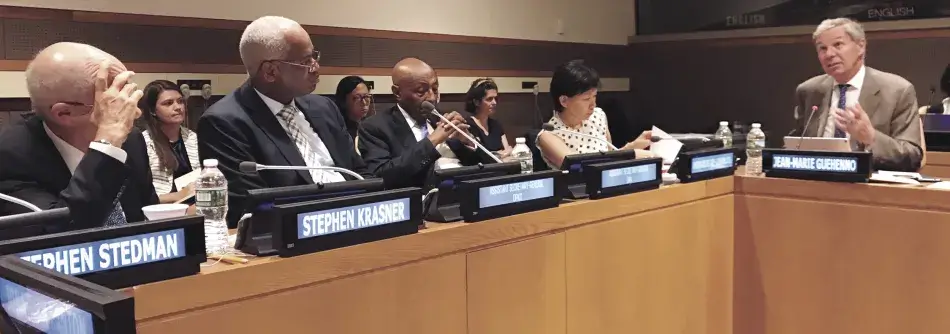
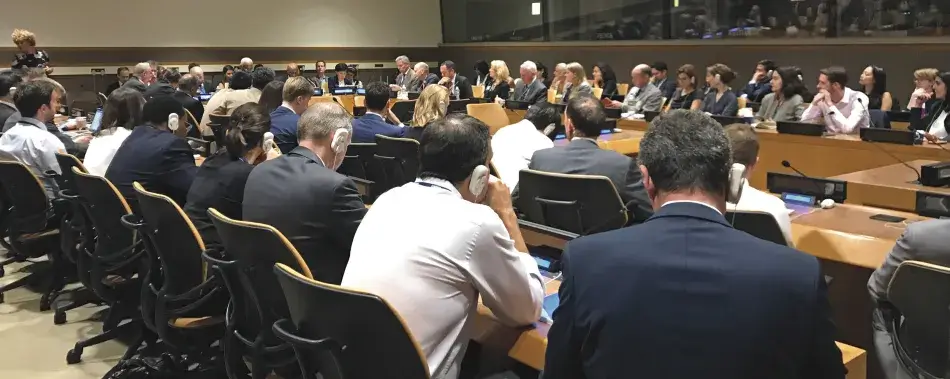
Civil Wars and International Order
September 13, 2017
New York, NY
At the first in a series of three workshops hosted in collaboration with the UN Department of Political Affairs and Department of Peacekeeping Operations, project contributors discussed possible trends in future civil wars, how UN peace operations can play a useful role, and the success criteria for peace operations.
Speakers
Renata Dwan
United Nations Department of Peacekeeping Operations
James Fearon
Stanford University
Michèle Griffin
Executive Office of the United Nations Secretary-General
Sarah Kenyon Lischer
Wake Forest University
Graham Maitland
United Nations Department of Political Affairs
Stephen Stedman
Stanford University
Cris Stephen
United Nations Department of Peacekeeping Operations

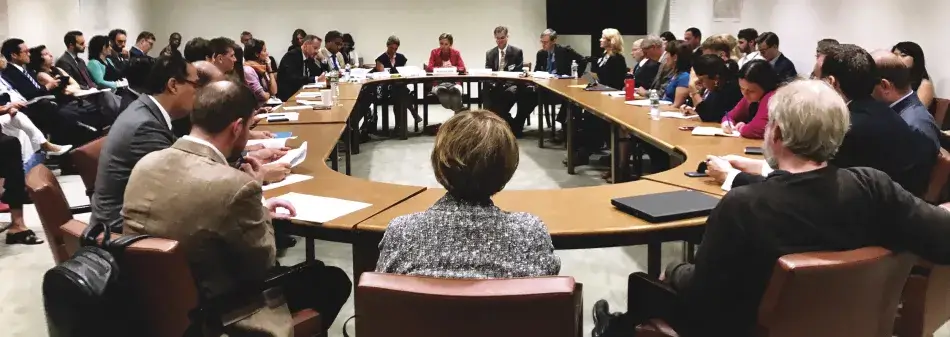
Institution-Building and Governance in Areas of Limited Statehood
October 18, 2017
New York, NY
At the second workshop hosted in collaboration with the United Nations, project participants shared findings from their Dædalus essays and explored alternative approaches to developing improved governance and state/society relationships in the wake of conflict.
Speakers
Susanna Campbell
American University
Adedeji Ebo
United Nations Department of Peacekeeping Operations
Richard Gowan
New York University; European Council on Foreign Relations
David Haeri
United Nations Department of Peacekeeping Operations
Steven Heydemann
Smith College
David Marshall
Office of the United Nations High Commissioner for Human Rights
Eric Stollenwerk
Freie Universität Berlin
Katy Thompson
United Nations Development Programme
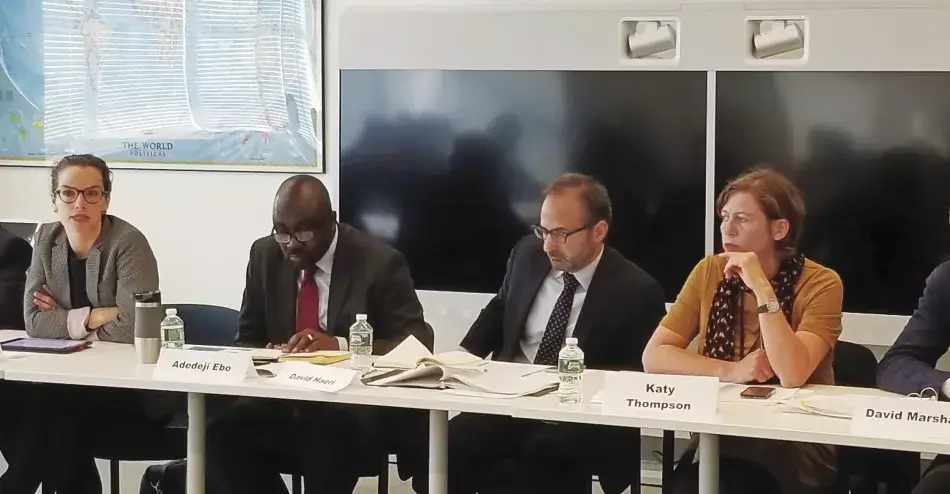
The Evolution of Armed Groups: Crafting Effective Responses
November 17, 2017
New York, NY
At the final workshop in the series organized in collaboration with the United Nations, the discussion focused on interdisciplinary approaches to thinking about how armed groups affect international order.
Speakers
Richard Atwood
International Crisis Group
Martha Crenshaw
Stanford University
Tanisha Fazal
University of Minnesota
Stathis Kalyvas
University of Oxford; formerly, Yale University
Thomas Kontgeorgos
United Nations Department of Peacekeeping Operations
Teresa Whitfield
United Nations Department of Political Affairs
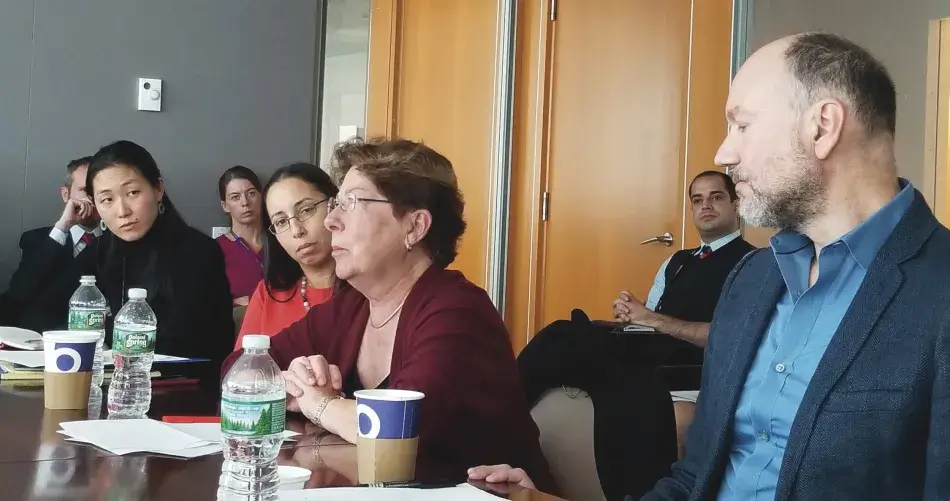
Civil Wars, Violence, and International Responses Capitol Hill Briefing
January 23, 2018
Washington, D.C.
At a briefing for junior- and senior-level Congressional staffers hosted by the Academy and Stanford University’s Hoover Institution, several project participants presented recommendations based on their work and research on civil wars and intrastate violence.
Participants
Stephen Biddle
Columbia University
Karl Eikenberry
Stanford University
Summers Hammel
American Academy of Arts and Sciences
Stephen Krasner
Stanford University
Nancy Lindborg
United States Institute of Peace
Stephen Stedman
Stanford University
Paul Wise
Stanford University

Briefings at the U.S. Department of Defense
January 23, 2018
Washington, D.C.
A small group of project contributors, led by project cochairs Karl Eikenberry and Stephen Krasner, met with staff members from the office of the Secretary of Defense and the office of the Chairman of the Joint Chiefs of Staff. The briefings included a general session attended by more than thirty mid-level Department of Defense personnel and a smaller, closed-door session that focused on counter-terrorism and counter-insurgency strategies.
Participants
Stephen Biddle
Columbia University
Karl Eikenberry
Stanford University
Summers Hammel
American Academy of Arts and Sciences
Stephen Krasner
Stanford University
Clare Lockhart
Institute for State Effectiveness
Stephen Stedman
Stanford University
Paul Wise
Stanford University
Briefing with the National Security Council (NSC)
April 13, 2018
Washington, D.C.
Several project contributors participated in a briefing with Nadia Schadlow, Deputy National Security Advisor to the President of the United States, and more than ten other NSC staff and regional specific directors. The project participants offered short- and long-term strategic policy planning recom- mendations for preventing, mitigating, and helping countries recover from civil violence.
Participants
Stephen Biddle
Columbia University
Karl Eikenberry
Stanford University
Francesca Giovannini
American Academy of Arts and Sciences
Summers Hammel
American Academy of Arts and Sciences
Stephen Krasner
Stanford University
Nancy Lindborg
United States Institute of Peace
Barry Posen
Massachusetts Institute of Technology
Civil Wars and Development Models
April 13, 2018
Washington, D.C.
In collaboration with the United States Institute of Peace, the Academy co-hosted a small lunch discussion on development models for conflict-ridden states. The speakers included project cochair Stephen Krasner as well as representatives from USAID and the World Bank. The discussion centered on the observation that during the post–Cold War era, governments and international institutions designed approaches to treat intrastate violence using mediation, peacekeeping operations, and development programs aimed at creating good governance and economic growth. The participants discussed the strengths and weaknesses of various development models in light of the current geopolitical landscape and lessons learned from past interventions.
Participants
Stephen Biddle
Columbia University
Franck Bousquet
World Bank
Karl Eikenberry
Stanford University
Joseph Hewitt
United States Institute of Peace
Stephen Krasner
Stanford University
Nancy Lindborg
United States Institute of Peace
Barry Posen
Massachusetts Institute of Technology
Kate Somvongsiri
USAID

Ending Civil Wars
The Academy co-hosted a panel discussion with the United States Institute of Peace that featured the issue of Dædalus on“Ending Civil Wars: Constraints & Possibilities,” which was published in connection with the project. The authors and project participants discussed how the United States could respond better to intrastate conflict and promote both development and stability to create lasting peace.
Participants
Stephen Biddle
Columbia University
Karl Eikenberry
Stanford University
Stephen Krasner
Stanford University
Nancy Lindborg
United States Institute of Peace
Clare Lockhart
Institute for State Effectiveness
Barry Posen
Massachusetts Institute of Technology
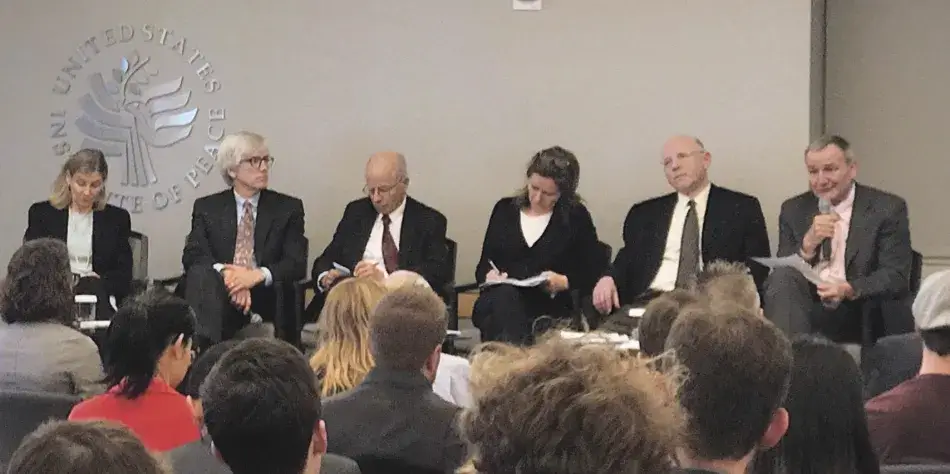
Meetings with International Organizations in Geneva
May 14 and 16, 2018
Geneva, Switzerland
In collaboration with the British Academy, the American Academy organized a series of briefings and discussions with representatives of several international organizations and NGOs in Geneva, including the Centre of Competence on Humanitarian Negotiation, the International Committee of the Red Cross, the Geneva International Centre for Humanitarian Demining, and the UN Development Programme. The participants discussed key findings of two Academy projects – New Dilemmas in Ethics, Technology, and War and Civil Wars, Violence, and International Responses – as well as the British Academy’s work on violence.
Participants
Christine Bell
University of Edinburgh
Tanisha Fazal
University of Minnesota
Philip Lewis
British Academy
Kathryn Moffat
American Academy of Arts and Sciences
Christina Moorhouse
British Academy
Stephen Stedman
Stanford University
Eric Stollenwerk
Freie Universität Berlin
Charles Tripp
British Academy; University of London
The Future of International Responses to Civil Wars and Conflict
The American Academy, the British Academy, and the Centre on Conflict, Development, and Peacebuilding at The Graduate Institute of International and Development Studies hosted a workshop that brought Geneva-based scholars and practitioners together with experts who are contributing to the British Academy’s work on violence and to the American Academy’s projects on New Dilemmas in Ethics, Technology, and War and Civil Wars, Violence, and International Responses. The participants discussed how international responses to civil wars are continuing to evolve. They also deepened their understanding about how different disciplines and organizations are approaching these issues.
Participants
Salman Bal
Office of the Director-General, United Nations Office at Geneva
Christine Bell
University of Edinburgh
Sebastian Brack
Kofi Annan Foundation
Christine Chinkin
London School of Economics
Eleanor Davey
University of Manchester
Alan Doss
Kofi Annan Foundation
Tanisha Fazal
University of Minnesota
Adrian Foster
Geneva Center for Security Policy; formerly, UN Department of Peacekeeping Operations; formerly, British Army
Florence Foster
Quaker United Nations Office
Francesca Giovannini
American Academy of Arts and Sciences
Maria Ottavia Guicciardini
The Graduate Institute of International and Development Studies
Catriona Gourlay
PeaceNexus Foundation
Sonja Grimm
University of Konstanz
Thomas Guerber
Geneva Centre for the Democratic Control of Armed Forces
Daniel Hyslop
Interpeace
Nora Keller
ETH Zurich
Keith Krause
The Graduate Institute of International and Development Studies
David Lanz
Swisspeace
Philip Lewis
British Academy
Gianluca Maspoli
Geneva International Centre for Humanitarian Demining
Brian McQuinn
International Committee of the Red Cross; The Graduate Institute of International and Development Studies
Kathryn Moffat
American Academy of Arts and Sciences
Christina Moorhouse
British Academy
Vanessa Parada González
World Health Organization
Sandra Reimann
The Graduate Institute of International and Development Studies
Tuesday Reitano
Global Initiative Against Transnational Organized Crime
Sara Sekkenes
United Nations Development Programme
Rhitu Siddharth
UN High Commissioner for Refugees
Anki Sjöberg
Geneva Call
Hugo Slim
International Committee of the Red Cross
Stephen Stedman
Stanford University
Eric Stollenwerk
Freie Universität Berlin
Charles Tripp
British Academy; University of London
Emmanuel Tronc
Conflict Dynamics International
Achim Wennmann
Geneva Peacebuilding Platform; The Graduate Institute of International and Development Studies

PROJECT
The Global Nuclear Future
The Global Nuclear Future (GNF) Initiative is an interdisciplinary and multinational project that is seeking to engage nuclear newcomers in conversations on nuclear safety, security, and nonproliferation.
As an increasing number of countries today explores the possibility of establishing nuclear power plants to meet the mounting energy needs of a growing population, it is important for the nuclear policy community worldwide to assist these countries in developing responsible nuclear programs in accordance with international standards of regulation and governance. The GNF project brings together diverse communities, including leading experts from academia, government, nongovernmental organizations, and the nuclear industry, to foster dialogue and debate with and among nuclear newcomers and encourage transparency and international cooperation.
The GNF Initiative has focused its work in three main areas:
- developing regional networks of knowledge in Southeast Asia and the Middle East that could assist nuclear new- comers and nuclear aspirant countries in establishing a safe, secure, and proliferation-resistant program;
- identifying the best strategies and policies to manage the nuclear fuel cycle, including the back-end of the nuclear fuel cycle and the transfer and governance of dual-use technology; and
- identifying possible strategies to minimize the risks of insider threats within nuclear laboratories and power plants.
Some of the project’s activities include convening nuclear experts and scholars to promote dialogue among regional players; hosting policy briefings and consultations with government officials and representatives of the nuclear industry; and commissioning papers and publications, often co-authored by regional experts, to enhance academic cooperation and nurture interstate intellectual exchanges.
Project Chairs
Steven E. Miller
Harvard Kennedy School
Robert Rosner
University of Chicago
Senior Advisor
Scott D. Sagan
Stanford University
Project Advisors
Richard A. Meserve
Covington & Burling LLP; formerly, Carnegie Institution for Science
Sam Nunn
Nuclear Threat Initiative
George Perkovich
Carnegie Endowment for International Peace
William J. Perry
Stanford University
William Potter
Middlebury Institute of International Studies at Monterey
John W. Rowe
Exelon Corporation, ret.
George P. Shultz
Stanford University
Project Staff
Francesca Giovannini
Kathryn Moffat
Funders
Carnegie Corporation of New York
Flora Family Foundation
The William and Flora Hewlett Foundation
The Kavli Foundation
John D. and Catherine T. MacArthur Foundation
Alfred P. Sloan Foundation
PROJECT PUBLICATIONS \\ THE GLOBAL NUCLEAR FUTURE
Main project publications:
Governance of Dual-Use Technologies: Theory and Practice, edited by Elisa D. Harris (American Academy of Arts and Sciences, 2016)
A Worst Practices Guide to Insider Threats: Lessons from Past Mistakes, Matthew Bunn and Scott D. Sagan (American Academy of Arts and Sciences, 2014)
Nuclear Collisions: Discord, Reform & the Nuclear Non- proliferation Regime, essay by Steven E. Miller, with responses by Wael Al-Assad, Jayantha Dhanapala, C. Raja Mohan, and Ta Minh Tuan (American Academy of Arts and Sciences, 2012)
The Back-End of the Nuclear Fuel Cycle: An Innovative Storage Concept, Stephen M. Goldberg, Robert Rosner, and James P. Malone (Amer- ican Academy of Arts and Sciences, 2012)
Nuclear Energy in the Middle East: Implications, Challenges, Opportunities (American Academy of Arts and Scienc- es, 2010)
Multinational Approaches to the Nuclear Fuel Cycle, Charles McCombie & Thomas Isaacs, Noramly Bin Muslim, Tariq Rauf,
Atsuyuki Suzuki, Frank von Hippel, and Ellen Tauscher (American Academy of Arts and Sciences, 2010)
Shared Responsibilities for Nuclear Disarmament: A Global Debate, essay by Scott D. Sagan, with responses by James M. Acton, Jayantha Dhanapala, Mustafa Kibaro- glu, Harald Müller, Yukio Satoh, Mohamed I. Shaker, and Achilles Zaluar (American Academy of Arts and Sciences, 2010)
“On the Global Nuclear Future,” vols. 1–2, Dædalus, edited by Steven E. Miller and Scott D. Sagan (Fall 2009 and Winter 2010)
A full list of all of the Global Nuclear Future project publications may be found on the Academy’s website at https://www.amacad.org/gnf.
PROJECT MEETINGS \\ THE GLOBAL NUCLEAR FUTURE
Multilateral Approach in Spent Fuel Management
September 26, 2017
Seoul, South Korea
The Global Nuclear Future Initiative co-convened a panel discussion during the 2017 global International Nuclear Fuel Cycle conference that examined the status of multilateral approaches to spent fuel management and the key challenge– including regionally and nationally specific issues–that will need to be overcome in order to identify new ways forward for multilateral spent fuel management.
 Speakers
Speakers
Yongsoo Hwang
Korea Atomic Energy Research Institute
William D. Magwood IV
OECD Nuclear Energy Agency
Andrew Newman
Nuclear Threat Initiative
Robert Rosner
University of Chicago
Man-Sung Yim
Korea Advanced Institute of Science and Technology
Solving the Unsolvable: Nuclear Waste Solutions for the New Millennium
April 6, 2018
Washington, D.C.
Managing spent fuel is one of the most significant challenges surrounding the use of nuclear energy. Although the technical means to build repositories exist, disposal attempts have often faced strong political and societal pushback. The Stimson Center and the American Academy convened experts from academia, government, NGOs, and the nuclear industry to discuss the existing interim storage facility proposals as well as the opportunities and challenges that lie ahead.
Speakers
Francesca Giovannini
American Academy of Arts and Sciences
Geordan Graetz
Department of State Development, Government of South Australia
Carlyn Greene
UxC
Mark Hibbs
Carnegie Endowment for International Peace
Tom Isaacs
Lawrence Livermore National Laboratory
Jacqueline Kempfer
Stimson Center
Charles McCombie
ARIUS Association
Andrew Newman
Nuclear Threat Initiative
Daniel B. Poneman
Centrus Energy Corp.
Robert Rosner
University of Chicago
Robert Sloan
Tulane Law School
Yea-Jen Tseng
Southern Taiwan University of Science and Technology
Cindy Vestergaard
Stimson Center
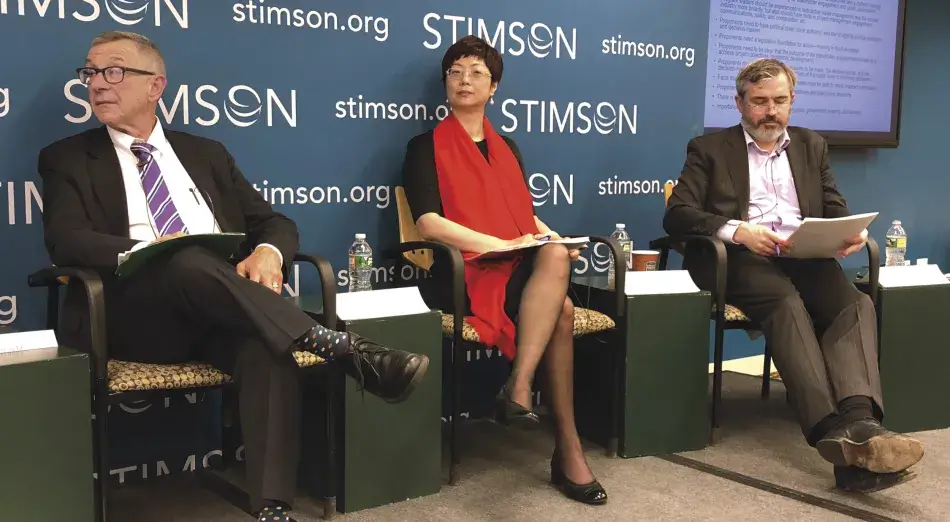
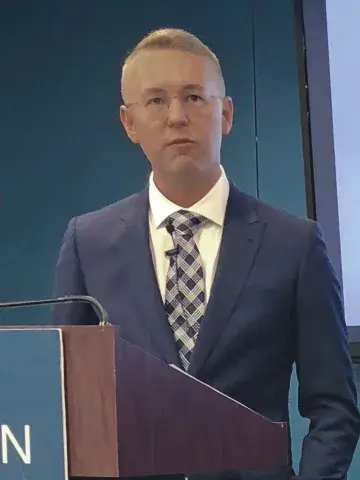
PROJECT
Meeting the Challenges of the New Nuclear Age
Meeting the Challenges of the New Nuclear Age will examine the challenges and opportunities presented by the changing nuclear age. The global nuclear order is evolving today along three main dimensions: 1) the nuclear posture of several nuclear weapons states has changed because of the possible use of nuclear weapons in war fighting; 2) technological innovations (in the space and cyber realm in particular, although not exclusively) are impacting existing nuclear arrangements (including the extended deterrence architecture and strategic stability); and 3) the changes in the current global nuclear order affect the prospects for nuclear arms control in a multipolar world.
This initiative is working to articulate a new framework for governing relations among the existing nine nuclear weapons states (with particular attention to strengthening strategic stability within the two critical nuclear triangles: China, the United States, and Russia as well as India, Pakistan, and China).
In order to achieve this goal, the project will:
-
- identify the four or five major dangers generated by the dynamics of a multipolar nuclear world–dangers that pose the greatest threat of inadvertent nuclear war;
- offer alternative approaches to addressing each of these dangers and then facilitate discussions with relevant communities in the United States and abroad; and
- encourage and assist policy-makers, Congress, the analytical community, and the media to think systematically about a world that is now multipolar.
Two cochairs, a small steering committee, and a larger working group lead the project. Six nuclear experts, with in-depth knowledge of nuclear issues, serve on the steering committee. They are helping to identify ways in which the project can have policy impact as well as how the project can engage internationally with nuclear communities beyond the United States.
Members of the working group include established scholars, rising scholars, former policy-makers, and diplomats. The inclusion of rising scholars is particularly significant. The working group serves as the main body for intergenerational and multidisciplinary discussions on current nuclear issues. The involvement of rising scholars brings fresh perspectives and innovative methodologies to the fore and greatly expands the capacity of the project to propose cutting-edge solutions to enduring nuclear risks.
In the past year, the working group has discussed five commissioned papers on key questions related to the current role that nuclear weapons play in global security. Among the topics discussed in the papers are the prospects for future arms control agreements between Russia and the United States; the conditions that make the use of nuclear weapons increasingly plausible in today’s world; and the increased complexity of nuclear deterrence among multiple nuclear weapons states. These essays appear in a series of occasional papers published in 2018.
Project Chairs
Christopher Chyba
Princeton University
Robert Legvold
Columbia University
Steering Committee
Thomas J. Christensen
Princeton University
Lynn Eden
Stanford University
Steven E. Miller
Harvard Kennedy School
Janne Nolan
George Washington University
Scott D. Sagan
Stanford University
Jon Wolfsthal
Nuclear Crisis Group
Working Group Members
James M. Acton
Carnegie Endowment for International Peace
Mark Bell
University of Minnesota
Linton Brooks
Center for Strategic and International Studies; formerly, U.S. Department of Energy and U.S. National Nuclear Security Administration
M. Taylor Fravel
Massachusetts Institute of Technology
Sumit Ganguly
Indiana University, Bloomington
Francis J. Gavin
Johns Hopkins School of Advanced and International Studies
Michael Krepon
Stimson Center
Hans Kristensen
Federation of American Scientists
Jessica Tuchman Mathews
Carnegie Endowment for International Peace
Nicholas Miller
Dartmouth College
Steven E. Miller
Harvard Kennedy School
Vipin Narang
Massachusetts Institute of Technology
Janne Nolan
George Washington University
Olga Oliker
Center for Strategic and International Studies
George Perkovich
Carnegie Endowment for International Peace
Steven Pifer
Brookings Institution; formerly, U.S. Department of State
William Potter
James Martin Center for Nonproliferation Studies, Middlebury Institute of International Studies at Monterey
Mira Rapp-Hooper
Yale Law School
Scott D. Sagan
Stanford University
Michael Swaine
Carnegie Endowment for International Peace
Nina Tannenwald
Brown University
Jane Vaynman
Temple University
Keren Yarhi-Milo
Princeton University
Project Staff
Francesca Giovannini
Kathryn Moffat
Funders
Louise Henry Bryson and John E. Bryson
John F. Cogan, Jr.
Lester Crown
Alan M. Dachs
Bob and Kristine Higgins
Kenneth L. and Susan S. Wallach
PROJECT PUBLICATIONS \\ MEETING THE CHALLENGES OF THE NEW NUCLEAR AGE
Meeting the Challenges of the New Nuclear Age: U.S. and Russian Nuclear Concepts, Past and Present, Linton Brooks, Alexei Arbatov, and Francis J. Gavin (American Academy of Arts and Sciences, 2018)
Meeting the Challenges of the New Nuclear Age: Emerging Risks and Declining Norms in the Age of Technological Innovation and Changing Nuclear Doctrines, Nina Tannenwald and James M. Acton, with an Introduction by Jane Vaynman (American Academy of Arts and Sciences, 2018)
PROJECT MEETINGS \\ MEETING THE CHALLENGES OF THE NEW NUCLEAR AGE
Meeting the Challenges of the New Nuclear Age: Working Group Meeting
December 18–19, 2017
Cambridge, MA
Members of the working group met to discuss some of the cur- rent nuclear challenges facing the international community, including the implications of the decline or collapse of arms control agreements, the consequences of a multipolar nuclear world, and the potential risks for nuclear escalation created by new technological developments. They also talked about possible policy responses and the best ways for the project to con- tribute to those discussions. The meeting helped to inform the selection of topics for forthcoming project publications and future convenings with international experts.
Participants
James M. Acton
Carnegie Endowment for International Peace
Mark Bell
University of Minnesota
Leyatt Betre
Princeton University
Linton F. Brooks
Center for Strategic and International Studies; formerly, U.S. Department of Energy; formerly, National Nuclear Security Administration
Thomas J. Christensen
Princeton University
Christopher Chyba
Princeton University
Jonathan F. Fanton
American Academy of Arts and Sciences
M. Taylor Fravel
Massachusetts Institute of Technology
Sumit Ganguly
Indiana University, Bloomington
Francesca Giovannini
American Academy of Arts and Sciences
Summers Hammel
American Academy of Arts and Sciences
Robert Legvold
Columbia University
David C. Logan
Princeton University
Jessica Tuchman Mathews
Carnegie Endowment for International Peace
Steven E. Miller
Harvard Kennedy School
Kathryn Moffat
American Academy of Arts and Sciences
Janne E. Nolan
George Washington University
Olga Oliker
Center for Strategic and International Studies
George Perkovich
Carnegie Endowment for International Peace
Steven Pifer
Brookings Institution
William Potter
James Martin Center for Nonproliferation Studies, Middlebury Institute of International Studies at Monterey
Peter Robinson
American Academy of Arts and Sciences
Scott D. Sagan
Stanford University
Michael D. Swaine
Carnegie Endowment for International Peace
Nina Tannenwald
Brown University
Jane Vaynman
Temple University
Kristin Ven Bruusgaard
Stanford University
Jon Wolfsthal
Harvard University
